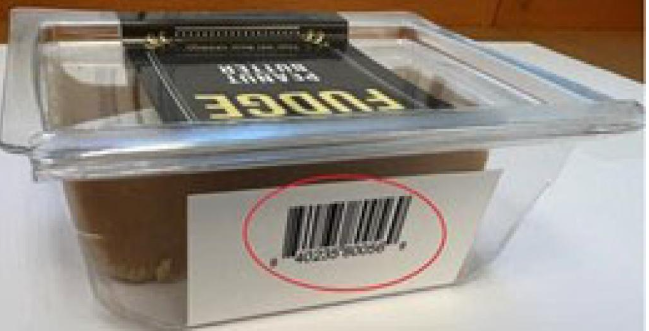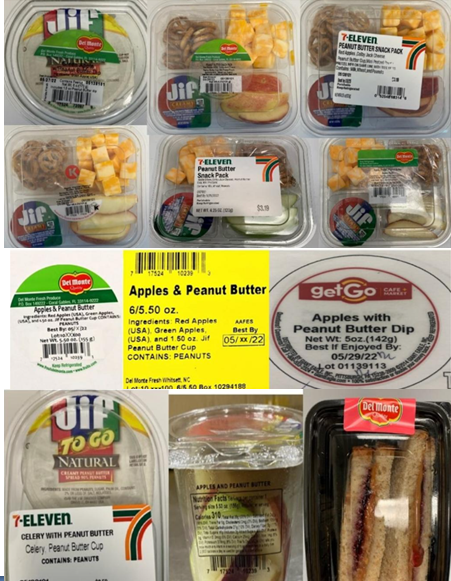The FDA reported that Country Fresh recalled select fresh-cut fruit snack trays and fruit snack cups containing Jif® peanut butter subject to a previously announced voluntary recall initiated by J. M. Smucker Co. The pre-packaged peanut butter components may potentially be contaminated with Salmonella. The fruit snack trays and fruit snack cups containing recalled peanut butter were distributed in various retail stores in Alabama, Connecticut, Delaware, Georgia, Florida, Louisiana, Maryland, Massachusetts, Mississippi, North Carolina, New Hampshire, New Jersey, New York, Pennsylvania, South Carolina, Tennessee, Virginia, Vermont, Washington, D.C., and West Virginia. The products are in a clear, square, or round plastic package, marked with “best by” date printed on the label. According to the CDC, several illnesses have been reported to date with the J. M. Smucker Co. recall. However, none have been confirmed to be associated with Country Fresh products. @ https://www.fda.gov/safety/recalls-market-withdrawals-safety-alerts/country-fresh-cooperation-j-m-smucker-co-voluntarily-recalls-select-items-containing-peanut-butter?utm_medium=email&utm_source=govdelivery
ruth
Country Fresh is voluntarily recalling select fresh-cut fruit snack trays and fruit snack cups containing Jif® peanut butter subject to a previously announced voluntary recall initiated by J. M. Smucker Co. The pre-packaged peanut butter components may have the potential to be contaminated with Salm
ruth
The FDA reported that Fudgeamentals of Melville, New York, recalled fudge made with Jif Peanut Butter, packaged in 8 oz. plastic containers and 16 oz. plastic trays. This product was recalled in response to the J.M. Smucker recall of Jif Peanut Butter due to possible Salmonella contamination. There have been no reports of injuries or adverse reactions due to the consumption of these products to date. @ https://www.fda.gov/safety/recalls-market-withdrawals-safety-alerts/fudgeamentals-recalls-fudge-made-jif-peanut-butter-because-possible-health-risk?utm_medium=email&utm_source=govdelivery
Fudgeamentals of Melville, New York is voluntarily recalling fudge made with Jif Peanut Butter, packaged in 8 oz. plastic containers and 16 oz. plastic trays, in response to the J.M. Smucker recall of Jif Peanut Butter due to possible Salmonella contamination. The FDA’s recall announcement can be
ruth
The FDA reported that Coblentz Chocolate Company (Walnut Creek, Ohio) recalled certain Peanut Butter Products due to Salmonella. This recall is a direct result of the J.M. Smucker Co. Jif® Peanut Butter recall. Coblentz Chocolate Company has ceased using Jif® Peanut Butter in production at this time. No illnesses have been reported to date. The products were distributed nationwide and reached consumers through the Coblentz Chocolate Company retail store and other retail locations. The products included in the recall were sold between November 12, 2021, and May 21, 2022. Products included in the recall are Peanut Butter Spread, Milk Chocolate Peanut Butter Cup, Graham Peanut Butter Sandwich, Ritz Peanut Butter Sandwich, Oversized Milk Chocolate Peanut Butter Cup, Fudge Sampler, Peanut Butter Fudge, Buckeye Fudge, Oversized Dark Chocolate Peanut Butter Cup, Oversized Peanut Butter Pretzel Cluster, Peanut Butter Truffle, Chocolate Peanut Butter Caramel Corn, Select Gift Boxes: 4 oz. Deluxe Assortment, 8 oz. Deluxe Assortment, 16 oz. Deluxe Assortment, 32 oz. Deluxe Assortment, 8 oz. Assorted Creams, 16 oz. Assorted Creams. @ https://www.fda.gov/safety/recalls-market-withdrawals-safety-alerts/coblentz-chocolate-company-recalls-select-peanut-butter-products-because-possible-health-risk?utm_medium=email&utm_source=govdelivery
Coblentz Chocolate Company of Walnut Creek, Ohio is recalling certain Peanut Butter Products because they have the potential to be contaminated with Salmonella, an organism which can cause serious and sometimes fatal infections in young children, frail or elderly people, and others with weakened imm
ruth
The FDA reported that the recall of J.M. Smucker’s peanut butter due to Salmonella had prompted Fresh Del Monte to recall fresh-cut fruit and vegetable products containing ready-to-eat JifÒ peanut butter dip due to Salmonella contamination. Fresh Del Monte recalled the following products, which were sold to retailers nationwide: Del Monte Apples with Peanut Butter (5 ounce) Peanut Butter Snack Pack (4.25 ounce), Apples and Peanut Butter (6 ounce, and 5.5 ounce), and Sandwich with Peanut Butter Cup. The recall of fresh-cut fruits and vegetables are packaged in clear plastic containers with a tamper-evident seal and identified with a Del Monte “Best If Used By” (DM BIUB) date on, or before, May 30, 2022. @ https://www.fda.gov/safety/recalls-market-withdrawals-safety-alerts/supplier-jm-smucker-cos-jif-recall-prompts-fresh-del-monte-voluntarily-recall-select-ready-eat
J.M. Smucker Co.’s voluntary recall of select Jif products in the United States has prompted Fresh Del Monte to voluntarily recall fresh-cut fruit and vegetable products containing ready-to-eat Jif peanut butter dip due to the potential presence of Salmonella contamination. In response and out of




